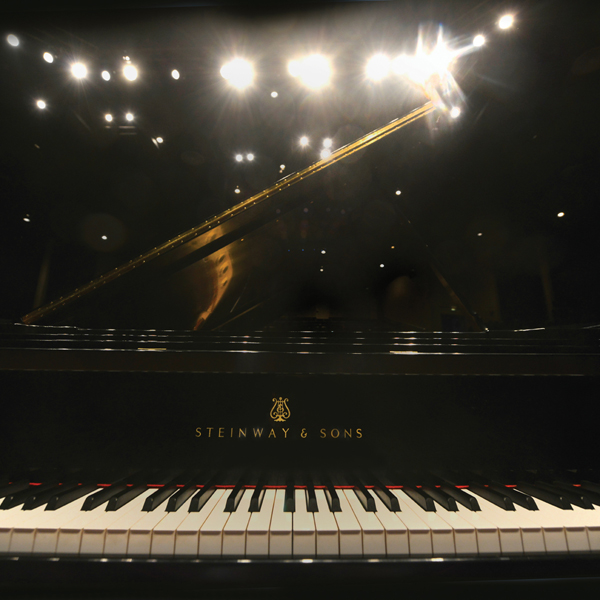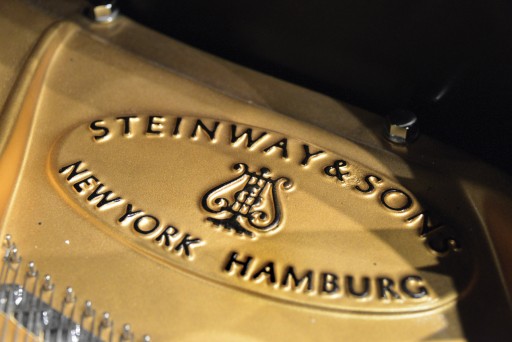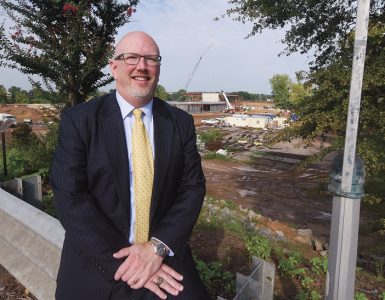Rosalyn Floyd enters the room with a mixture of excitement and fear. Honestly, the whole process is a little terrifying. Blind dates are never easy, but here in New York City, it feels like everything is hanging in the balance, and the whole speed-dating structure that follows is so unnatural, it’s intimidating.
How do you form an honest, informed opinion from a series of such brief encounters? Can you really build a long-term relationship from so little?
But Floyd has come prepared. As difficult and awkward as the process might be, she’s taking it seriously. So much so that she’s brought a folder with her. The papers inside will help keep her evaluations as uniform as possible. After all, she wants apples-to-apples comparisons because, when you’re talking long-term relationships and you’ve flown all the way to New York from Augusta, you leave nothing to chance.
After the first four meetings, her anxiety gives way to panic. While none of the meetings has gone poorly, not one has left her in a swoon, either. And isn’t that what’s supposed to happen? Isn’t her pulse supposed to quicken, her heart supposed to race? When the connection is right, aren’t you just supposed to know?
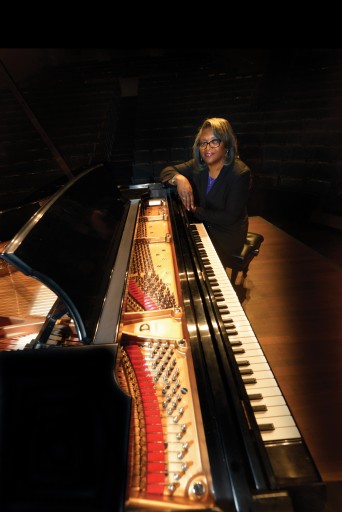
And then, when she pulls out the bench and sits down for her fifth and
final introduction, it happens. Her pulse races, her heart pounds — and a
pleasant certainty envelops her.
That fifth Steinway Concert D — it is, without a doubt, the one.
Steinway’s skilled craftspeople use the same tools, machines, and techniques their 19th-century counterparts did.
When Floyd, a Professor of Music who teaches piano, speaks about the pianos in her life — and there have been many — it’s not unusual for her to give them human attributes.For example, talking about a renovation of the Fine Arts building, a time when all the pianos were moved out, she sounds almost responsible for whatever indignities her studio piano, a smaller Model M Steinway, was forced to endure.
“I don’t know where they moved them, but when my piano came back, it was in dire shape, and my pianos are not used to that kind of treatment,” she says. “I almost wanted to apologize to the piano for putting it through that. First, it had to be moved, and then the climate wasn’t what it liked.”
Climate is important to pianos of all shapes and sizes, but it’s particularly important to concert-grade instruments, which despite their size, are incredibly delicate and have ridiculously small tolerances. Throw in the fact that so much of it is made of wood, and you’ve got a recipe for a needy and sometimes temperamental investment.
A High-Stakes Purchase
When pianist and public radio personality Christopher O’Riley performed at the Maxwell Theatre in March as part of the Lyceum Series, Georgia Regents University’s benchmark performing arts series, he played the concert on the university’s new piano, one of a pair of 9-foot Steinways the school uses for performances.
Floyd was there to see O’Riley, but she was also anxious to hear if the Steinway was up to the job. O’Riley is one of the nation’s top classical pianists, so it’s a little like having a race car driver take your car out for a spin — he can probably get more out of it than you knew was there. “I sat in the back listening to him performing, and the piano just spoke so beautifully in that room,” Floyd says. “I was just thrilled at that.”
To say Floyd was relieved would be an understatement, since she and Dr. Martin David Jones, a Professor of Music who teaches piano and is the orchestra director, were pretty much single-handedly responsible for the choice of that particular instrument. At a cost of $117,000, it’s a decision that doesn’t come easily, especially when much of the money was provided by donors, including generous contributors to a grassroots “88 Keys” campaign.
“It was extremely successful,” Dr. Angela Morgan, Chair of the Department of Music, says of the campaign. “We had this big graph with all the keys of the piano, and we priced each of them differently. The least expensive keys were around $200-$300, while the most expensive ones were around $10,000.”
That kind of buy-in only made the actual purchase that much more thrilling — and high stakes.
“Rosalyn and I were flown up to New York and got to take a tour of the Steinway factory,” Jones says. “It was fascinating to see each step of the manufacturing process, and when we were brought to the testing room, that was really special.”
Steinways are made in only two places, Hamburg, Germany, and New York City, and they remain the gold standard for concert pianos. It takes a year for Steinway’s skilled craftspeople to create a piano. They use the same tools, machines, and techniques their 19th-century counterparts did to painstakingly — and lovingly — piece together the 12,000 parts that go into each instrument. “If you’re buying a 9-foot instrument for a concert hall, Steinway is the piano that most artists prefer to play,” Jones says. “… ‘Steinway’ is kind of the Good Housekeeping Seal of Approval.”
After the tour of the factory, which included lunch, Jones and Floyd were brought to the testing room, where five 7-foot grands and five 9-foot grands were set up for them to choose from. Because they were choosing a piano for the 740-seat Maxwell Theatre, they passed over the Concert Bs and went right for the larger Concert Ds. Steinways come with a specific lettering system: S, M, B, and D. As the story goes, the letters stand for small, medium, big, and damn big. “That’s just the old, old joke,” Floyd says. “Even if it’s not true, it makes for a good story.”
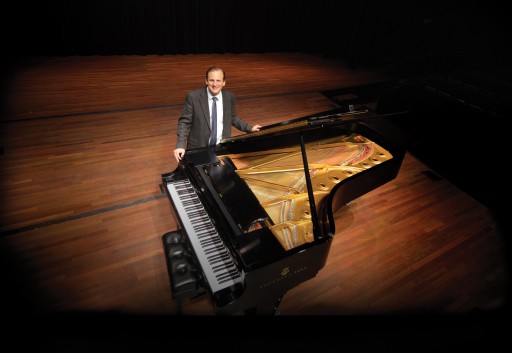
With a technician on hand, Floyd and Jones played each of the pianos, taking care to keep the evaluation as controlled as possible. “It wasn’t so much about quality as it was personal taste and trying to decide which would be the best piano for the space we have, because pianos speak differently in different spaces,” Floyd says.
A perfect example is the Steinway Harry and Vola Jacobs bought for their home. Harry was the founding Director of the Augusta Symphony, now Symphony Orchestra Augusta, and Vola was a longtime piano teacher on the Summerville Campus. When Floyd went to the Jacobs’ home to play the 9-foot European Steinway, she was surprised to find she didn’t like it, though she was too polite to say so.
After Vola Jacobs passed away in 2010, the piano went to Reed Memorial church, and when Floyd attended a piano performance a short time later, she was surprised again — this time she loved it. “It sounded phenomenal,” she says. “In that space, because it’s so much larger and there was more resonance in that particular place, it just sounded great.”
So with space in mind, Floyd and Jones went from piano to piano, playing their individual choice of music on each one. “It was kind of a Goldilocks thing,” Jones recalls. “This bed is too hard; this one is too soft.” As luck would have it, the one that seemed just right to Floyd was the last one she played. “That piano was just so gorgeous,” she remembers. “I was sitting there playing it, thinking ‘Hmm — I hope Martin likes this one, because this is the one we’re taking home.’”
Jones, it turns out, felt the same way. “The first four were all good 9-foot Steinways, but the fifth one we clearly thought was the best,” he says. “And since it’s been brought down here and played — I’ve played recitals on it — I think we made a good choice.”
The First Steinway
Though its life before arriving at then-Augusta College is unclear, GRU’s older 9-foot Concert D dates from the high-quality period around WWII. “The Steinways that were pre-war almost always have great quality,” says Floyd. “There was a time when CBS owned Steinway for a hot second as the kids say, but the ones that came out of that era were never as good as the pre-war ones.” Such luminaries as Richard Cass, John Browning, and Claude Frank played on that piano, though when Floyd arrived in 1988, it was in a classroom. “I couldn’t understand why it was in a classroom, but I didn’t question it because it meant every musical example I played was going to be just wonderful,” she says. “It had a beautiful sound.”
Not everyone was a fan. A visiting pianist came in as part of the Jacobs Concert Series and complained about it. “She basically insulted the old Steinway and said that it wasn’t up to what she was going to play,” Floyd says. “But it was a blessing in disguise, because that’s why we got the new one. If that kind of thing was going to happen, we needed to have a piano we could use.”
Ultimately, Floyd says they put more than $22,000 into the old Steinway, basically gutting it, and when it came back, it sounded wonderful. The rebuilding process is expensive and drastic, but luckily the GRU pianos don’t suffer the same abuse experienced by those in larger organizations. At the Atlanta Symphony, for example, visiting artists can be pretty hard on pianos. “We’re talking the best artists in the world, and they play very big because they’re in a big hall,” Jones says. “They play loud, and they play big. And those instruments get beat up pretty hard. They don’t last more than a couple of years before they need a rebuild.”
Without that kind of use, Jones says he hopes to get a decade or so before they have to do any major work, though even the preventive maintenance can be costly. “This department just doesn’t have the money to do the kind of maintenance that should be done,” Floyd says. “If all things were equal and we had the money, we’d have a resident technician, but we don’t; so basically we get all the pianos tuned twice a year.” The exception would be the two Concert Ds, which get tuned before recitals.
A New Home
Though they always coveted a climate-controlled room for the two Steinways, the need became especially evident when the boiler went down during a January cold snap a few years ago. “You could hang meat in both of those buildings,” Morgan says. “We had one of our cellos crack, and the pianos got so out of tune.”
Even without acts of God like the malfunctioning boiler, the pianos always presented a difficult tradeoff for the Maxwell Theatre — keep the venue at a constant temperature and humidity level, which is a costly proposition, especially in the summers, or allow the pianos to suffer from the extreme fluctuations. That’s why Morgan fought for funding for a climate-controlled room, which was completed last summer at a cost of $27,000. Located in the basement just a short elevator ride from the stage, it is tightly sealed and has its own dedicated HVAC system to keep the humidity and temperatures steady. “If you’re going to get that kind of instrument, then investing in taking care of it is a good idea,” Jones says.
Floyd agrees. “I don’t know about the medical side of the university, but I would bet my bottom dollar that with the exception of maybe a mainframe computer, these pianos are the most expensive things on campus,” she says.

